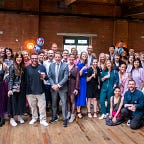Design Thinking is transforming HR
The pandemic brought about a seismic shift in the way we work that has disrupted our lives forever. The democratisation of work — the increasing trend toward detaching work from its traditional confines of space, time and structure — means HR functions are racing to understand how their roles need to change.
As a result, we’ve seen droves of HR professionals calling on Design Thinking, a method traditionally used by product and proposition teams, to reposition themselves as strategic and creative problem solvers. The challenges businesses are now facing require speedy resolution, often digital, so Design Thinking provides the tools needed to evaluate employee needs then test, learn and iterate before scaling — our mantra is always “life is too short to build stuff that no one wants”.
In the last few years we have supported dozens of HR teams to apply Design Thinking to a range of problems — redesigning mandatory training to boost compliance, improving remote collaboration, rethinking digital learning to increase impact, modernising Executive development programmes as well as optimising the hybrid office/home experience as offices began to open up.
We have found that those HR teams who are adopting Design Thinking, which prioritises user needs, are becoming even more empathetic to employee needs. One of which is “valuing experiences over process and policies’’ as work becomes more remote and digital. Employees are calling for face to face moments, which are decreasing in frequency, to be cherished and memorable experiences. Facilitated by HR, Design Thinking has a critical role to play in supporting leaders to make social events, training and collaboration activities more planful, better designed and really well facilitated to maximise the effort and expense of commuting.
“ We started with a 12 week project, and we’ve been working with the Magnetic team for nearly a year now… I’m very grateful for the partnership we’ve formed. What’s made them stand out is their agile ways of working and openness to adapt. In this increasingly dynamic time, it’s ensured our deliverables meet the needs of our business quickly and create real value.”
Alison Mulligan, Director, Future of Work and Global Workplace Transformation, Mars Inc.
According to Forbes, we are in an exciting new era of “hyper-innovation” and in light of this the People Teams we are working with are not only taking a long hard look at themselves, but also at the role of leaders in the future. During Covid we observed that the organisations that were much more agile, that had distributed decision-making were the ones who responded the fastest and the best — in a rapidly changing world, working in this way should be the modus operandi and not just reserved for a crisis. So we’re now helping HR Directors and CPOs to redefine and rebuild leadership capability in light of this new era of work. The core elements of Design Thinking is forming a major part of the syllabus; problem framing, researching needs (both customer and employee), ideation (digital and analogue) through to experimentation.
To find out more visit our website: Magnetic Training or get in touch with the author and Business Director at Magnetic: toby.debelder@wearemagnetic.com.
